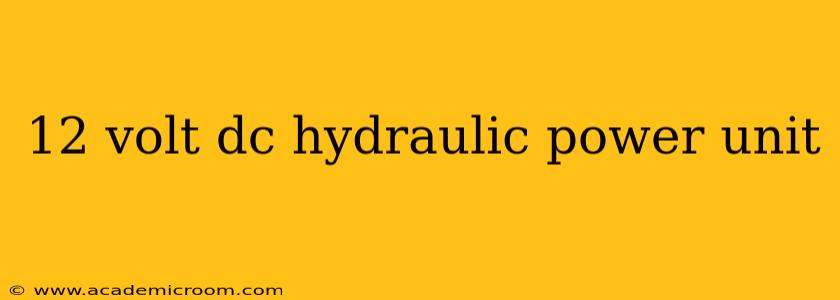A 12-volt DC hydraulic power unit (HPU) is a compact and self-contained system that converts electrical energy into hydraulic power. These units are ideal for applications where a small, portable, and low-voltage power source is required. Unlike their larger AC counterparts, 12V DC HPUs are perfect for mobile equipment, robotics, and other situations where space and power constraints are paramount. This guide will delve into the specifics of these units, answering common questions and providing valuable insights for anyone considering using or purchasing one.
What are the Applications of a 12 Volt DC Hydraulic Power Unit?
12-volt DC hydraulic power units find applications in a wide range of industries and applications thanks to their portability and low voltage requirements. Some common uses include:
- Mobile Equipment: Small agricultural machinery, construction tools, and even some specialized vehicles benefit from the compact size and ease of use of a 12V DC HPU.
- Robotics: Precise control of hydraulic actuators is crucial in robotics, and these units provide a clean, efficient, and easily integrated power solution.
- Automated Systems: Industrial automation often involves small-scale hydraulic movements, making 12V DC HPUs a cost-effective and reliable choice.
- Marine Applications: Smaller boats and watercraft can utilize these units for various hydraulic functions.
- Medical Equipment: Some specialized medical devices rely on precise hydraulic movements, where the low voltage and compact nature of these units is advantageous.
What are the Key Components of a 12 Volt DC Hydraulic Power Unit?
A typical 12V DC HPU comprises several essential components working together to generate hydraulic pressure:
- 12V DC Motor: This is the heart of the system, converting electrical energy into mechanical energy. The motor's power rating directly influences the HPU's capacity.
- Hydraulic Pump: The pump draws oil from a reservoir and increases its pressure, providing the hydraulic power needed for the system. Different pump types (e.g., gear pumps, vane pumps) offer varying performance characteristics.
- Hydraulic Reservoir: This container holds the hydraulic fluid, acting as a storage and supply for the pump. Its size impacts the HPU's continuous run time.
- Control Valves: These regulate the flow and direction of hydraulic fluid, enabling precise control of actuators. Solenoid valves are commonly used in 12V DC HPUs.
- Hydraulic Actuators: These are the end effectors, performing the actual work – linear movement (cylinders) or rotary motion (motors).
What are the Advantages of Using a 12 Volt DC Hydraulic Power Unit?
Choosing a 12V DC HPU offers several key benefits:
- Portability and Compact Size: Their smaller size and lighter weight compared to AC HPUs make them highly portable and suitable for mobile applications.
- Low Voltage Operation: Operating on a standard 12V DC supply simplifies power requirements and enhances safety.
- Easy Integration: Their relatively simple design facilitates easy integration into various systems and machinery.
- Precise Control: Control valves allow for precise control of hydraulic functions, critical for many applications.
- Cost-Effectiveness: In many cases, 12V DC HPUs offer a cost-effective solution compared to other power options for small-scale hydraulic applications.
What are the Different Types of 12 Volt DC Hydraulic Pumps Used?
Several types of pumps can be incorporated into a 12V DC HPU, each with its own strengths and weaknesses:
- Gear Pumps: Simple, robust, and relatively inexpensive, gear pumps are suitable for low-pressure applications.
- Vane Pumps: Offer higher pressure capabilities than gear pumps and are often preferred for demanding applications.
- Piston Pumps: Provide the highest pressure output but are generally more complex and expensive than gear or vane pumps. The choice of pump type depends largely on the specific application's pressure and flow requirements.
How Much Pressure Can a 12 Volt DC Hydraulic Power Unit Generate?
The pressure a 12V DC HPU can generate varies greatly depending on the pump type, motor power, and overall system design. Small units might produce only a few hundred PSI, while more powerful systems can achieve pressures in the thousands of PSI. Always check the manufacturer's specifications for the exact pressure capabilities of a specific model.
How Do I Choose the Right 12 Volt DC Hydraulic Power Unit for My Needs?
Selecting the appropriate 12V DC HPU requires careful consideration of several factors:
- Required Pressure and Flow Rate: Determine the pressure and flow rate needed for your actuators to perform their intended function.
- Duty Cycle: Consider how frequently and for how long the HPU will operate.
- Power Requirements: Ensure your 12V DC power source can adequately supply the HPU's power needs.
- Environmental Conditions: Consider the operating temperature and potential exposure to moisture or other environmental factors.
- Size and Weight Constraints: Assess the available space and weight limitations for your application.
By carefully considering these factors, you can choose a 12V DC HPU that meets your specific needs and provides reliable, efficient hydraulic power for your application. Remember to consult the manufacturer's specifications and seek expert advice when necessary.
